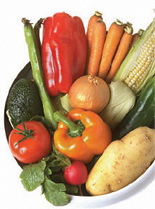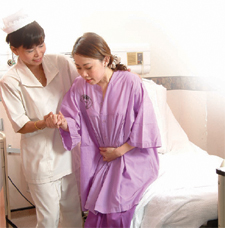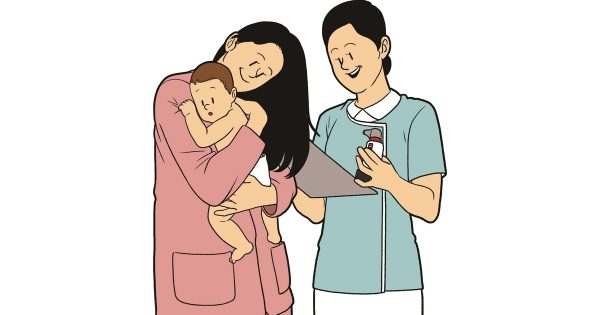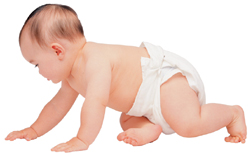Congratulations! After nine long months, your little bundle of joy is finally in your arms. While you make sure that your little one gets a good start in life, you also need to take especially good care of yourself after having gone through tremendous changes to your body during pregnancy, labour and birth. Believe it or not, even after childbirth, your body still needs to go through changes as it recovers and prepares you for the challenges of caring for your new baby.
During the first few weeks after childbirth, you will most probably have some discomfort and even pain as your body struggles to transform back to its prepregnancy condition. Listen to your body for any of these symptoms and take the necessary action. In the meantime, eat healthily and stay physically active.
Try not to leave all responsibilities to your midwife or a member of your family if you can. If you want to catch up on all the things that you have missed while you were pregnant soon, learn to take certain matters into your own hands and you will be out and about in no time. Rest assured that your road to recovery is not all work and no play. You can still enjoy your new baby. Besides, the sheer joy of having your new baby will most likely compensate for the struggles you may have to face along the way. You will find your efforts worthwhile as good recover and restoration after childbirth will help you achieve long-term physical and emotional health.
Changes to your body
You will experience many changes to your body after you have given birth. There is no reason to panic as these changes are normal. Here are some changes that you can expect:
- Your womb will gradually shrink back to the normal size. Because of this, you may feel cramping pains in your lower abdomen for several days. Do not be alarmed as this is a good sign that your body is returning to normal.
- You will have a bright red, bloody discharge (also called lochia) from your vagina during the first 3-4 days after delivery. It will gradually change to pale brown and then, yellow over the next 10-14 days. It may be followed by one of your normal periods.
- Hormonal changes will occur, preparing your breasts for breastfeeding. More blood is circulated through the breast tissue causing your breasts to swell, harden and become warm.
Caring for yourself after birth
You will most probably feel sore and experience bleeding after birth. Here’s what you can do to take care of yourself during this time:
- Take warm, shallow baths to relieve soreness and hasten healing. If you have stitches, dry the areas thoroughly afterwards.
- Lie down as much as possible to take pressure off the stitches.
- Wear sanitary pads to catch the flow of your discharge. Avoid using tampons as they can cause infection.
- Change your sanitary pads often so that you can observe the colour of the discharge. Tell your doctor if you notice anything out of the ordinary.
- Do not strain yourself, especially while recovering from a Caesarean delivery. Get your family and friends to help around the house during the first few days after going home.
- Drink plenty of water and eat high-fibre foods (eg. fruits and vegetables) to stimulate your bowels. When you need to open your bowels, do so at once. Do not strain or push.
- Avoid driving until after 6-8 weeks.
- Practise pelvic floor exercises to speed up healing and get back into shape. Build up your exercise regime slowly and gradually. Stop immediately if you feel pain or are tired. You can begin these exercises from the first day after birth. However, if you have had a Caesarean, you will not be ready to begin exercising until much later after birth. Check with your doctor first before exercising. You should also avoid abdominal exercises until your doctor says it is safe to do them.
- Remember to go to your doctor for a check-up about six weeks after the birth.

Confined?
During the first few weeks after birth or better known as the confinement period, you are bound to be caught in the web of ‘advice’ from your grandmother, mother, mother-in-law, aunts and even relatives and friends, especially if you have just given birth to your first baby. Advice such as “Do not eat ‘cooling’ foods such as jackfruit and melon”, “Do not watch TV or read” and “Do not drink water for the first 20 days, drink only rice wine (without alcohol)” may sound familiar to you. You may also be expected to follow certain confinement practices such as drinking herbal soups and tonics, going for a traditional massage using a heated stone or wrapping yourself tightly in a herbal wrap while standing over a fire.
Since you have been brought up in an Asian society which is anchored by traditions and customs, you may feel the need to follow these confinement practices. Although there is no scientific basis to these beliefs, it is all right to follow them provided they do not cause damage to your health and body. As such, make sure that you do not omit certain foods from your diet which could cause you to miss out on important nutrients. Since some traditional methods could even be hazardous if not done properly, please use your common sense and practise caution and moderation at all times. Most importantly, continue to adopt good lifestyle habits and eat a balanced and varied diet.







Comments